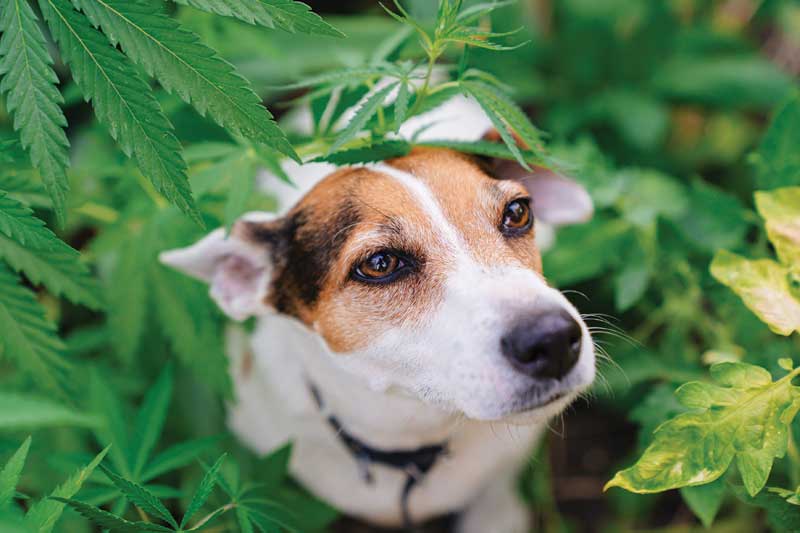What is beginning to emerge in the literature base are areas of cannabinoid (CBD) efficacy. There is considerable conjecture and preclinical information established suggesting the non- Delta-9-tetrahydrocannabinol (THC) CBD have potential efficacy in areas such as acute and chronic pain, immunosuppression, cancer formation or suppression, neurological disorders, and dermatological conditions.1
These in-vitro or preclinical rodent models are promising, but one must remember in-vitro studies often use high micromolar concentrations that may not be achievable in the living animal through typical oral dosing.1 Similarly, there is disparity in preclinical rodent models, where much of the promise is in models delivering the cannabinoid of interest intraperitoneally, which bypasses hepatic and enterocyte metabolism, and are often given at much higher concentrations than what is delivered orally. This makes clinical investigation essential before recommending hemp cannabinoids or CBD as a practitioner.
Hemp products will be from low THC and will have less than 0.3 percent. The major cannabinoid found in hemp is typically cannabidiolic acid (CBDA), and acid derivative native to the plant, which when harvested and extracted, is often decarboxylated into CBD.
It must be recognized there are some products from hemp that are pure CBD isolates, while other extracts from the whole hemp product will contain other minor cannabinoids, such as THC, cannabigerol, cannabichromene, cannabadivirin, and their acid derivatives as well as flavonoids and terpenes as a generalization (See Figure 1). These products are traditionally termed as “broad spectrum” or “full spectrum.” A review of the current regulatory environment can be found in the Journal of the American Veterinary Medical Association (JAVMA) May 2023 issue, which addressed quality control issue, as well as the legality of hemp.2
This being said, there is data emerging detailed below in three areas where CBD-rich hemp cannabinoids appear to be promising, including chronic pain of osteoarthritis, atopic dermatitis, and refractory seizures.

Chronic pain of osteoarthritis
One study used a CBD-/CBDA-rich hemp product, which was an equal mix of CBD and CBDA and was provided to dogs in a crossover placebo-blinded study over four weeks for each arm of the study. It showed benefits based on validated subjective measurements using the canine brief pain index (CBPI).3 Owners were provided these surveys at two and four weeks, and the CBD/CBDA treatment showed an average 20-point drop in the CBPI survey with over 75 percent of dogs responding. The dose utilized in this study was 2 mg/kg every 12 hours in a long chain oil base.
A second study utilized a smaller cohort of dogs using a CBD-rich hemp product. There were four groups of five dogs receiving a placebo as medium chain triglyceride (MCT) oil, 20 mg/dog/day or 50 mg/dog/day of CBD-rich isolate in MCT base or a 20 mg dose of a microsomal encapsulated CBD-rich hemp product.4
The trial was for a month utilizing the Helsinki Chronic Pain Index (HCPI). It showed a significant drop in the HCPI in the groups treated with 50 mg/day dose of CBD-rich hemp in MCT oil and 20 mg dose of microsomal encapsulated formulation.
A third study randomized placebo-controlled study examined dogs with clinical arthritis that were being managed on firocoxib or low-dose prednisone, as well as amitriptyline and gabapentin, which could not be changed during the 12-week trial.5
The CBD-rich hemp in MCT oil was dosed at 2 mg/kg every 12 hours orally. CBPI evaluation at zero, one, two, four, and 12 weeks of treatment showed significant decreases compared to placebo at one, two, four, and 12 weeks. The significant differences in pain scoring from baseline were observed over time in the treatment group only.
The fourth study was a randomized placebo-controlled crossover study, where 23 dogs were administered placebo of only hempseed oil or treatment using 2.5 mg/kg of a CBD isolate in hempseed oil for six weeks trial of each.6
The outcome measures at three, six, nine, and 12 weeks were compared to initial screening, which included the CBPI, Liverpool Osteoarthritis in Dogs (LOAD) questionnaire, assessments of total weight bearing, and percentage of weight bearing. For nearly all subjective and objective observations, there were improvements during the CBD-rich isolate treatment that were greater than placebo. However, significant effects from placebo at each time point were not observed.
Clinical application for atopic dermatitis
A recent placebo-blinded study utilizing a dose of 2 mg/kg every 12 hours of CBD-/CBDA-rich hemp in 17 dogs, with 12 receiving placebo sesame oil for four weeks, was performed.7 Subjective veterinary measurements of inflammation using the Canine Atopic Dermatitis Scoring Index (CADESI) and owner vertical analog pruritus assessments were performed, suggesting dogs in the CBD-/CBDA-rich treatment group had significant decreases in pruritus, with 65 percent responding and approximately 30 percent achieving complete resolution of pruritus. Surprisingly, a study examining normal shelter dogs at similar dosing showed only significant alteration in activity in kenneled dogs was “itching” behaviors, suggesting alteration in pruritus.8
In the atopic dermatitis study, the enrollees were dogs with refractory atopic dermatitis that were relatively unresponsive to other traditional treatments, leading to the question of how efficacious would CBD-rich hemp be for milder cases?
Refractory seizure control
CBD isolate is an FDA-approved treatment modality for children with various seizure disorders as a second or third tier medication to control seizure activity.9 There is now emerging work in dogs, where a pilot study using a CBD isolate at 2.5 mg/kg every 12 hours, appears to be more favorable than placebo. However, the response rate, which was a 50 percent reduction in seizure activity, was found in 33 percent of the dogs on CBD that correlated to serum concentrations of CBD where dogs with higher serum concentrations was more favorable.10
A second study using 2 mg/kg of an equal mix of CBD-/CBDA-rich hemp in a placebo-blinded cross over a 12-week study showed positive results in dogs with refractory seizures, with nearly a 50 percent reduction in seizure episodes and days of seizures. Six of the 14 dogs had a 50 percent or greater reduction in seizure activity during CBD/CBDA-rich hemp use.11
More importantly, serum concentrations of phenobarbital, zonisamide, and bromide were measured in this study, which showed no interactions with other commonly used anti-epileptic drugs.
Adverse events across studies
Across studies using CBD- and CBDA-rich hemp products there are occasional reports of somnolence and behavioral issues in general, but were often not severe enough across canine studies to preclude continued treatment.3-11 Many canine clinical studies have followed complete blood counts (CBC) and serum biochemistry. Three- and six-month safety studies of CBD or CBD-/CBDA-rich product chronic administration at 2 and 4 mg/kg/day showed safe administration with no alterations in CBC and occasional rises in serum alkaline phosphatase (ALP) as the primary observation in some dogs.12,14
Clinically, ALP rises concurrently with CBD use is not accompanied by rises in other liver-associated parameters such as gamma glutamyl transferase, alanine aminotransferase or bilirubin. Therefore, an ALP rise of this nature is often innocuous; however, it should be monitored with routine bloodwork, particularly to differentiate a drug effect or an endocrine effect/disease such
as hyperadrenocorticism.

Conclusions
Although the use of cannabinoids, particularly CBD-rich hemp products, is in its infancy in veterinary medicine, there appears to be optimism regarding its utilization concurrently with other therapeutics for a range of disorders, including epileptic seizure control, pain associated with osteoarthritis, and atopic dermatitis.
There is currently no convincing evidence CBD products have utility in anxiety and behavioral disorders in dogs, but a recent study in car ride models suggests some possible utilization for situational anxiety, which required further research.14
Though promising results are emerging in dogs, there is currently no clinical studies in cats, horses, or other companion veterinary species.
Joseph J. Wakshlag, DVM, PhD, is a graduate of Cornell College of Veterinary Medicine, where he also completed his PhD and board certifications in Nutrition and Sports Medicine and Rehabilitation. Dr. Wakshlag is currently a professor at the Department of Clinical Sciences of Cornell University, and chief of the Nutrition Service. His research interests have led to many publications in cancer cell biology, canine metabolism and obesity, sporting dog physiology and the use of supplements in osteoarthritis. Dr. Wakshlag’s recent interest in cannabinoids has led to 15 publications in this emerging arena. He also consults with Ellevet Sciences as their chief veterinary medical officer.
References
- Castillo-Arellano J, Canesco-Alba A, Cutler SJ, Leon F. The polypharmacological effects of Cannabidiol. Molecules, 2023; 28:3271.
- Henion J, Evans S, Wakshlag JJ. Key quality control aspects about cannabinoid-rich hemp products that a veterinarian needs to know: a practitioner’s guide. J Am Vet Med Assoc. 2023; 261(7):1054-1060.
- Gamble LJ, Boesch JM, Frye CW, et al. Pharmacokinetics, Safety, and Clinical Efficacy of Cannabidiol Treatment in Osteoarthritic Dogs. Front Vet Sci. 2018;5:165. doi:10.3389/fvets.2018.00165.
- Verrico CD, Wesson S, Konduri V, et al. A randomized, double-blind, placebo-controlled study of daily cannabidiol for the treatment of canine osteoarthritis pain. Pain. 2020;161(9):2191-2202.
- Brioschi FA, Di Cesare F, Gioeni D, et al. Oral Transmucosal Cannabidiol Oil Formulation as Part of a Multimodal Analgesic Regimen: Effects on Pain Relief and Quality of Life Improvement in Dogs Affected by Spontaneous Osteoarthritis. Anim Open Access J MDPI. 2020;10(9):E1505.
- Mejia S, Duerr FM, Griffenhagen G, McGrath S. Evaluation of the Effect of Cannabidiol on Naturally Occurring Osteoarthritis-Associated Pain: A Pilot Study in Dogs. J Am Anim Hosp Assoc. 2021;57(2):81-90.
- Loewinger M, Wakshlag JJ, Bowden D, Peters-Kennedy J, Rosenberg A. The effect of a mixed cannabidiol and cannabidiolic acid based oil on client-owned dogs with atopic dermatitis. Vet Dermatol. 2022;33(4):329-e77.
- Morris EM, Kitts-Morgan SE, Spangler DM, et al. Feeding Cannabidiol (CBD)-Containing Treats Did Not Affect Canine Daily Voluntary Activity. Front Vet Sci. 2021;8:645667.
- Lattanzi S, Zaccara G, Russo E, La Neve A, Lodi MAM, Striano P. Practical use of pharmaceutically purified oral cannabidiol in Dravet syndrome and Lennox-Gastaut syndrome. Expert Rev Neurother. 2021 Jan;21(1):99-110
- McGrath S, Bartner LR, Rao S, Packer RA, Gustafson DL.J Randomized blinded controlled clinical trial to assess the effect of oral cannabidiol administration in addition to conventional antiepileptic treatment on seizure frequency in dogs with intractable idiopathic epilepsy. Am Vet Med Assoc. 2019 Jun 1;254(11):1301-1308.
- Garcia GA, Kube S, Carrera-Justiz S, Tittle D, Wakshlag JJ. Safety and efficacy of cannabidiol-cannabidiolic acid rich hemp extract in the treatment of refractory epileptic seizures in dogs. Front Vet Sci. 2022 Jul 29;9:939966.
- Deabold KA, Schwark WS, Wolf L, Wakshlag JJ. Single-Dose Pharmacokinetics and Preliminary Safety Assessment with Use of CBD-Rich Hemp Nutraceutical in Healthy Dogs and Cats. Anim Open Access J MDPI. 2019;9(10):E832.
- Bradley S, Young S, Bakke AM, et al. Long-term daily feeding of cannabidiol is well-tolerated by healthy dogs. Front Vet Sci. 2022;9:977457.
- Hunt ABG, Flint HE, Logan DW, King T.A single dose of cannabidiol (CBD) positively influences measures of stress in dogs during separation and car travel. Front Vet Sci. 2023 Feb 22;10:1112604.



